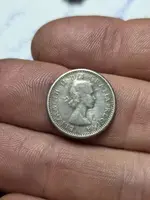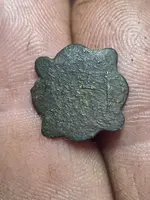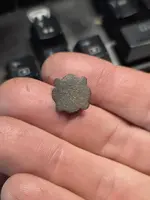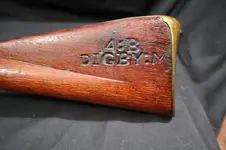Glen's Loyalists
Full Member
We've been busy lately and I have a few searches to put up, but I will start with last Sundays trip back to the old inn where we found a slew of 16th Regiment buttons along with some nice finds including a counterfeit 8 reals.
Last time we got a lovely 1840 Thistle Halfpenny along the road, so we thought we would try the road a bit more and my son got this wonderful 1817 George III silver bulls head shilling. Most of the 200+ year old silvers that we find tend to be very worn, sometimes completely smooth, due to a century or more in circulation, so it was a treat to see this one in such wonderful shape. Only 4 inches down it was a belting signal I am told.




That's our first bulls head. So we can cross it off the list.
Still on the silver, my son also got a 1959 10 cent with George's great great great great granddaughter.


My only silver of the day is a typically worn smooth cut coin that has a diameter that exactly matches a Spanish 1 Real of 1726 that I found a couple of years back.


I also found another nice Thistle Halfpenny. Not as good as the 1840 I found last time here, it is still a pretty decent 1832. Buried in thick anerobic mud, it is interesting to see the colour variation on the small portion that was more exposed.


Here, along with a bit of spoonage, is the final coin, which was rather oddly a memorial Lincoln head that somebody had a beef against. At first we thought it was shot, but the hole is square. (We have found shot Lincoln head cents before, and considering that they were likely chosen from handfuls of George VI cents, I suspect it was intentional. The guy can't catch a break.)

This is an interesting little mount that I found. I am not quite sure if there was ever anything on it or not


My son got this hard to find military Sappers and Miners two piece button with a Victorian Cypher on it. Buttons are among our favorites.

Also from the road, a dropped musket ball. It exactly fits the barrel of my 1805 Digby Militia Brown Bess, so it would be a 75 caliber.

Of course the obligatory flat buttons...

And as an update on the folded lead counterfeit 8 reals that I found, I had to open it.


To find a still silvered interior. I can see the final 2 in the date and what looks to be IV to the left and DE(I GRATIA) on the right. But Charles used IIII and not IV. Perhaps it was supposed to be a Ferdinand VII. I suspect they just got it wrong. The British counterfeited a large number of Spanish 8 reals from about 1780 to 1820, to try to debase the Spanish currency, but they were mostly copper with a silver electroplate, but perhaps they did lead as well.


On the bottom of the photo to the right the final 2 in the date is visible.
In total as far as coins go, so far the site has produced a 1694 William and Mary Half Penny, 1817 Silver British Shilling, a cut Spanish 1 real (likely), a counterfeit 8 reals, 1806/7 cut British half penny, very nice 1832 and 1840 thistle half pennies, along with a later 1907 silver Canada 5 cents and 1947 and 1959 silver 10 cents. So, 5 silvers to 4 coppers, I like that ratio. We are already planning on returning as soon as we can.
Happy hunting everybody.
Last time we got a lovely 1840 Thistle Halfpenny along the road, so we thought we would try the road a bit more and my son got this wonderful 1817 George III silver bulls head shilling. Most of the 200+ year old silvers that we find tend to be very worn, sometimes completely smooth, due to a century or more in circulation, so it was a treat to see this one in such wonderful shape. Only 4 inches down it was a belting signal I am told.
That's our first bulls head. So we can cross it off the list.
Still on the silver, my son also got a 1959 10 cent with George's great great great great granddaughter.
My only silver of the day is a typically worn smooth cut coin that has a diameter that exactly matches a Spanish 1 Real of 1726 that I found a couple of years back.
I also found another nice Thistle Halfpenny. Not as good as the 1840 I found last time here, it is still a pretty decent 1832. Buried in thick anerobic mud, it is interesting to see the colour variation on the small portion that was more exposed.
Here, along with a bit of spoonage, is the final coin, which was rather oddly a memorial Lincoln head that somebody had a beef against. At first we thought it was shot, but the hole is square. (We have found shot Lincoln head cents before, and considering that they were likely chosen from handfuls of George VI cents, I suspect it was intentional. The guy can't catch a break.)
This is an interesting little mount that I found. I am not quite sure if there was ever anything on it or not
My son got this hard to find military Sappers and Miners two piece button with a Victorian Cypher on it. Buttons are among our favorites.
Also from the road, a dropped musket ball. It exactly fits the barrel of my 1805 Digby Militia Brown Bess, so it would be a 75 caliber.
Of course the obligatory flat buttons...
And as an update on the folded lead counterfeit 8 reals that I found, I had to open it.
To find a still silvered interior. I can see the final 2 in the date and what looks to be IV to the left and DE(I GRATIA) on the right. But Charles used IIII and not IV. Perhaps it was supposed to be a Ferdinand VII. I suspect they just got it wrong. The British counterfeited a large number of Spanish 8 reals from about 1780 to 1820, to try to debase the Spanish currency, but they were mostly copper with a silver electroplate, but perhaps they did lead as well.
On the bottom of the photo to the right the final 2 in the date is visible.
In total as far as coins go, so far the site has produced a 1694 William and Mary Half Penny, 1817 Silver British Shilling, a cut Spanish 1 real (likely), a counterfeit 8 reals, 1806/7 cut British half penny, very nice 1832 and 1840 thistle half pennies, along with a later 1907 silver Canada 5 cents and 1947 and 1959 silver 10 cents. So, 5 silvers to 4 coppers, I like that ratio. We are already planning on returning as soon as we can.
Happy hunting everybody.
Attachments
Upvote
15








 Thank you for sharing with us
Thank you for sharing with us